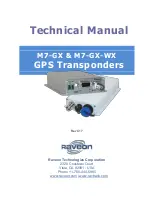
Version C16. February 2013
Raveon Technologies Corporation
Company Confidential
4
1. General Information about the RV-M7
1.1.
Congratulations!
Congratulations on your purchase of a
RV-M7
GPS tracking radio
– the most
advance UHF radio modem available today.
Please take a few minutes to read this manual carefully. The information presented
here will allow you to derive maximum performance from your radio modem. After
reading it, keep the manual handy for quick reference, in case questions arise later
on.
1.2.
NOTICE
Besides the fuse, there are no user-serviceable points inside this transceiver. All
service work must be referred to your Authorized Service Center or Raveon
Technologies Service Department.
1.3.
Safety / Warning Information
WARNING
- DO NOT operate theRV-M7-U radio modem when bystanders are
within 2 feet (.6 meters) of the antenna.
The RV-M7 radio should be installed in safe, protected and restricted environment.
While the RV-M7 does have an internal 3A fuse, there is no internal circuit breaker.
The radio should be connected with an external circuit breaker.
Blasting Caps and Blasting Areas
To avoid possible interference with blasting operations, turn off this radio or remove
the DC power when you are near electrical blasting caps, in a blasting area, or in
areas posted: “
Turn off two-way radio
.” Obey all signs and instructions.
Potentially Explosive Atmospheres
Turn off your radio prior to entering any area with a potentially explosive
atmosphere. Do not install this product for use in areas with potentially explosive
atmospheres. Do not remove, install, or charge batteries in such areas. Sparks
in
a potentially explosive atmosphere can cause an explosion or fire resulting in
bodily injury or even death.
Note:
The areas with potentially explosive atmospheres referred to above include fueling areas
such as below decks on boats, fuel or chemical transfer or storage facilities, areas where the air
contains chemicals or particles, such as grain, dust or metal powders, and any other area where
you would normally be advised to turn off your vehicle engine. Areas with potentially explosive
atmospheres are often but not always posted.





































